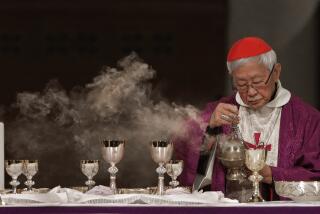Annulments Are Only Option for Catholics : Divorce: Sen. Kennedy and his fiancee must invalidate their previous marriages before they can wed in a religious ceremony. Some say revision of the process is needed.
- Share via
If Sen. Edward M. Kennedy and his fiancee decide to seek annulments of their marriages in order to remarry in the Roman Catholic Church, they will be undertaking a procedure used successfully by tens of thousands of the faithful each year.
Annulments--a process in which the church can find that, according to its standards, a marriage was invalid--frees people to marry in a Catholic ceremony even though they are legally divorced.
The subject has cropped up in the media because of Cardinal Bernard Law’s declaration that Kennedy will not be permitted to marry in the church. The Boston archbishop said the 60-year-old Massachusetts Democrat is still married in the eyes of the church, even though he has a civil divorce from his previous wife, Joan.
Kennedy’s fiancee, Washington lawyer Victoria Reggie, 38, is also a Catholic and divorced. Neither has made any comments on the cardinal’s statement or the matter of annulments.
The situation is increasingly faced by American Catholics who divorce and want to remarry and remain practicing Catholics. The way out of the dilemma is to seek an annulment from a diocesan tribunal, the legal entity in the Catholic Church that rules on the requests. In the United States, 61,416 annulments were granted in 1989, the last year for which figures are available. The U.S. figure represents, by far, the largest share of the 77,319 annulments granted worldwide that same year.
Figures also show that annulments have become increasingly more frequent and easy to obtain in the United States over the last 25 years. During that time, the categories under which annulments can be granted have been greatly expanded.
Annulments can be granted for a variety of reasons. They include a finding that one or both of the partners did not fully consent to the union or lacked the ability to make a lasting commitment and carry it out, perhaps because of some psychological impediment.
The investigation is based on questionnaires sent to the partners and to “witnesses”--family members or friends who know them well.
In 1967, tribunals in the United States granted 700 annulments, according to University of Notre Dame historian Jay Dolan in his book, “The American Catholic Experience.” That number jumped to 25,000 in 1978 and 53,320 in 1985.
Under normal circumstances, without an annulment a Catholic who has separated or divorced a partner must remain unmarried in order to remain a full member of the church. Those who remarry without an annulment must refrain from reception of the sacraments.
Annulments, despite the frequency, are controversial. A standard teaching guide on annulments acknowledges that the church’s ability to declare a marriage invalid after many years often evokes “a cry of anguish from many sincere Catholics who are puzzled, upset and at times angry” about the procedure.
Some view a loosening of requirements for annulments in recent years as a compassionate and pastoral step to help people get on with their lives as full members of the church.
Others see the procedure as cruel and hypocritical, particularly in the case of a Catholic partner who opposes an annulment petition and disagrees with a judgment that his or her marriage was never valid. Some see it as a kind of legal sleight of hand that permits the church to recognize the reality of divorce while upholding the permanence of marriage.
Father Charles Curran, a Catholic priest and a theologian who has written that the Catholic Church should change its teaching and recognize divorce, cites problems with the system. Annulments are “not an honest way of dealing with the problem,” he said. “The problem is that something broke up, not that something never existed.”
Curran, who teaches at Southern Methodist University, is formerly a professor at Catholic University in Washington. He left that school after running into opposition from church authorities for his writings on sexual ethics.
Curran said the annulment system dates to the tribunal in the Brooklyn diocese 30 years ago. He said the canon lawyers in that diocese were among the first to take the old categories of annulment--which limited annulments to physical impediments or severe psychological disabilities--and developed them from a modern psychological viewpoint. By doing so, the categories under which individuals might be deemed incapable of making a permanent commitment increased dramatically. “It is applying psychological evidence after the fact,” said Curran. “And of course, the reason has to be relative, not absolute, or you would never be able to marry anyone.”
The implication, that anyone seeking an annulment would be able to find some imperfection on which to hang their case, is one of the objections raised about the practice.
More to Read
Sign up for Essential California
The most important California stories and recommendations in your inbox every morning.
You may occasionally receive promotional content from the Los Angeles Times.













